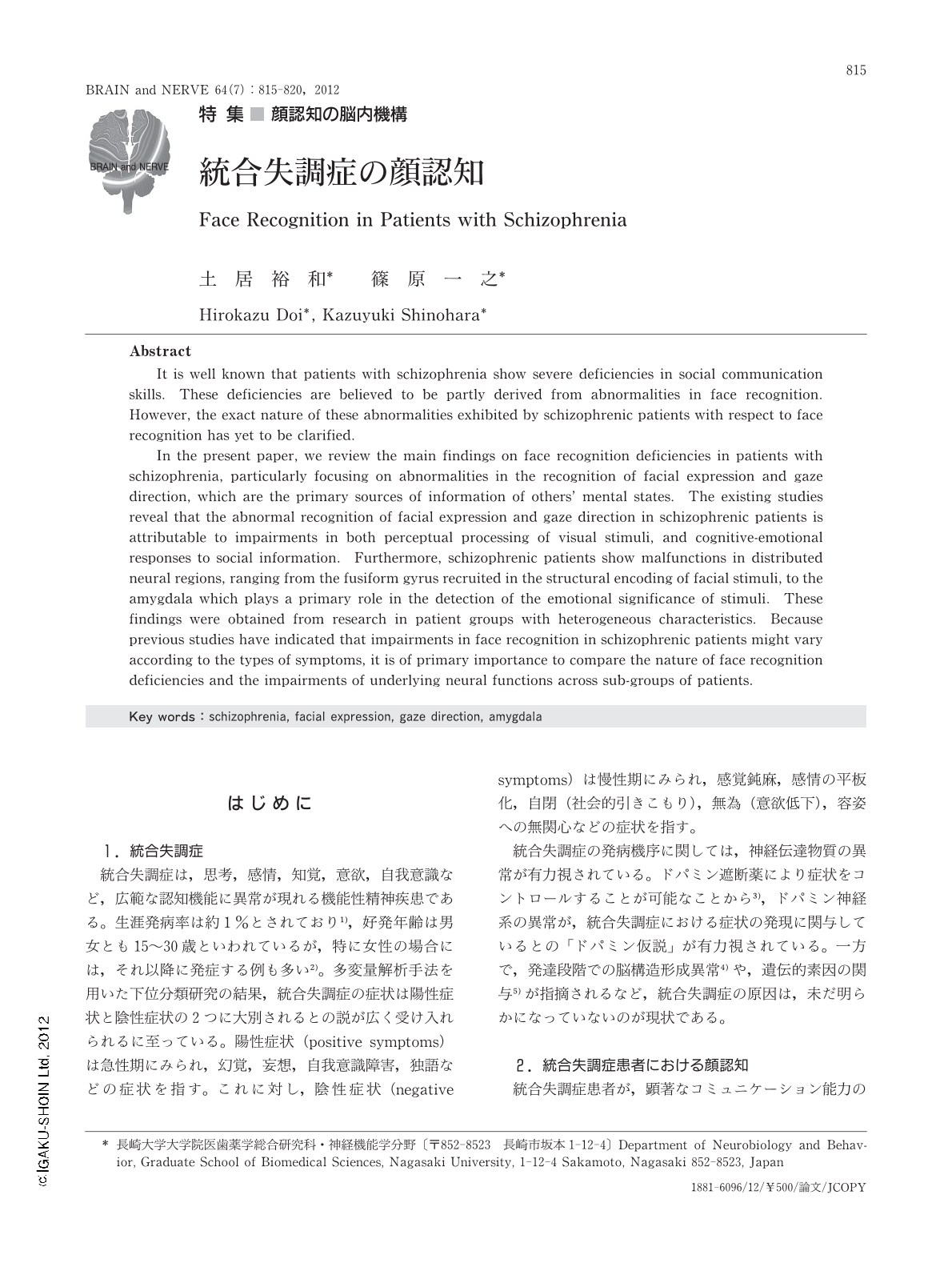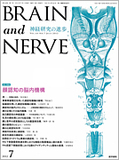Japanese
English
- 有料閲覧
- Abstract 文献概要
- 1ページ目 Look Inside
- 参考文献 Reference
はじめに
1.統合失調症
統合失調症は,思考,感情,知覚,意欲,自我意識など,広範な認知機能に異常が現れる機能性精神疾患である。生涯発病率は約1%とされており1),好発年齢は男女とも15~30歳といわれているが,特に女性の場合には,それ以降に発症する例も多い2)。多変量解析手法を用いた下位分類研究の結果,統合失調症の症状は陽性症状と陰性症状の2つに大別されるとの説が広く受け入れられるに至っている。陽性症状(positive symptoms)は急性期にみられ,幻覚,妄想,自我意識障害,独語などの症状を指す。これに対し,陰性症状(negative symptoms)は慢性期にみられ,感覚鈍麻,感情の平板化,自閉(社会的引きこもり),無為(意欲低下),容姿への無関心などの症状を指す。
統合失調症の発病機序に関しては,神経伝達物質の異常が有力視されている。ドパミン遮断薬により症状をコントロールすることが可能なことから3),ドパミン神経系の異常が,統合失調症における症状の発現に関与しているとの「ドパミン仮説」が有力視されている。一方で,発達段階での脳構造形成異常4)や,遺伝的素因の関与5)が指摘されるなど,統合失調症の原因は,未だ明らかになっていないのが現状である。
2.統合失調症患者における顔認知
統合失調症患者が,顕著なコミュニケーション能力の障害を示すことは広く認められている。また,これら患者が呈する「社会性の問題」の少なくとも一部は,顔認知能力障害に起因すると考えられている。しかし,その一方で,統合失調症における顔認知障害をもたらす神経機能異常の詳細に関しては,未解明の点が多い。そこで,本稿では,社会的コミュニケーションにおいて特に重要な役割を果たす,表情認識・視線方向認知を中心として,統合失調症患者の顔認知に関する行動学的・神経科学的知見を概説する。
Abstract
It is well known that patients with schizophrenia show severe deficiencies in social communication skills. These deficiencies are believed to be partly derived from abnormalities in face recognition. However, the exact nature of these abnormalities exhibited by schizophrenic patients with respect to face recognition has yet to be clarified. In the present paper,we review the main findings on face recognition deficiencies in patients with schizophrenia,particularly focusing on abnormalities in the recognition of facial expression and gaze direction,which are the primary sources of information of others' mental states. The existing studies reveal that the abnormal recognition of facial expression and gaze direction in schizophrenic patients is attributable to impairments in both perceptual processing of visual stimuli,and cognitive-emotional responses to social information. Furthermore,schizophrenic patients show malfunctions in distributed neural regions,ranging from the fusiform gyrus recruited in the structural encoding of facial stimuli,to the amygdala which plays a primary role in the detection of the emotional significance of stimuli. These findings were obtained from research in patient groups with heterogeneous characteristics. Because previous studies have indicated that impairments in face recognition in schizophrenic patients might vary according to the types of symptoms,it is of primary importance to compare the nature of face recognition deficiencies and the impairments of underlying neural functions across sub-groups of patients.

Copyright © 2012, Igaku-Shoin Ltd. All rights reserved.


